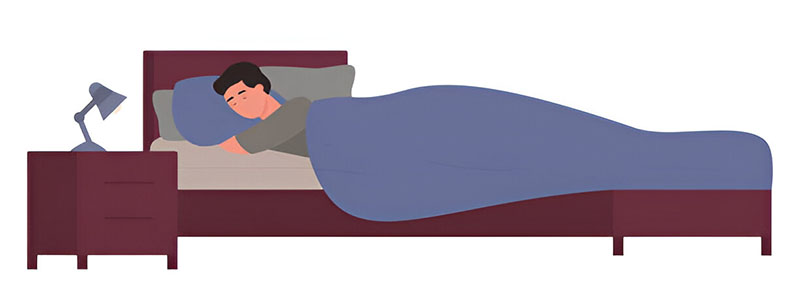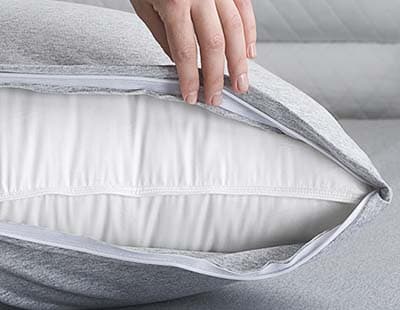We have often discussed how essential pillows can be for a good night’s sleep and how crucial they are for our nightly sleeping postures. But there is no such thing as ‘just one thing.’ Several other factors affect the quality of your sleep, one of which is a Weighted Comforter.
Some people need clarification on the term and its meaning. We have heard of multiple terms related to bedding products like Duvets and Weighted Blankets, but we have also discussed those. We are here to discuss everything necessary to know about comforters today!
What is a Weighted Comforter?
Do you often struggle to fall asleep at night and put your mind off many things? A weighted comforter might be your friend in need. Comforters are thicker and fluffier in structure. They are stylish, too. If you like to keep the ambiance in your room intact, then a weighted comforter might be the one for you.
They come in various designs and patterns for every season and personal preference so that you can use them as a top covering for your bed. Like a weighted blanket, comforters consist of an outer layer called the shell sewn together with a gridded stitch pattern to keep all the filler material inside the bedcover.
Unlike any weighted fleece blanket, a weighted comforter is fluffy and airy, giving you a smooth feeling of sleeping like a baby! The comforters use inner materials such as cotton, wool, or down alternatives. Hence, the comforter set provides warmth and a cloud-like appearance.
How to Use a Weighted Comforter?
A weighted comforter is nothing from outer space! It is as easy as any other bedding item you’ve come across. It can be used just as you use a blanket. How you use a weighted comforter is a call on your preferences. After all, your comfort matters! But the least we can do is share some ideas that might help you get the gist to begin in case you are new to the concept:

Test It Before You Buy It
There is no right or wrong time to use your weighted comforter, but if you consider putting it to the test, we suggest doing it during your night's sleep. Try to use it according to your sleep routines as much as possible for best results. Assess how calming and comfortable it is for you, then decide based on its merits.
You Can Try Replacing Your Blanket or Use Both
A weighted comforter is an all-rounder. It can even replace your regular blanket or duvet. If you are someone who doesn’t want too much on their bed and prefers just one item for a purpose, then weighted comforters are the way to go! But as we always say, it’s all about your preferences. So, if you want to use both, you can place the weighted on the top or below the weighted comforter.
Make Sure to Cover Your Whole Body
If you wish to experience the full extent of a weighted comforter's comfort, we suggest spreading it over your entire body, from your neck down to your feet. If you are new to this, consider taking a blanket and covering your legs with that, keeping the weighted comforter just over your torso.
If you are a regular blanket user, getting used to the comforter might take some time. But here is a tip! If you are a back sleeper, it’d be easy to cover yourself entirely with the comforter. This practice is nothing but a way to test this product; it is unnecessary.
Let Your Body Get Used to It
Using anything for the first time might feel weird. You should keep using it regularly to test its long-term benefits. A day or two might not cut it for you. Don’t give up on it so quickly; it might be slow to catch up, but it is pure bliss once it happens!
Keep Seeing the Improvement
Keep going while you are on this experiment track! Just don’t forget to track its progress with time. Is it worth your money? Does it have any improvements in the quality of your sleep at night? Do you find it too heavy? Or does it help keep you comfy? Keep all of this in your mind before you put your final bid on it.
How to Pick The Best Weighted Comforter for All Your Sleeping Needs?
Now that we have laid out all the possible ways to test out a comforter, it’d be much easier to decide whether you want to get one. Let’s help you choose the perfect one:
Weight
This might be the most essential thing to consider when buying a comforter. Weighted comforters, by their very nature, are heavier than compared to any blanket or duvet. They are fluffy and mushy to spread an even and gentle pressure on your body to help you sleep much faster and better by giving a hug-like feeling at night.
People who suffer from night terrors, fear of the dark, or anxieties have seen the best results from a weighted comforter, especially when they sleep alone. However, if you buy a comforter much heavier than your body can handle, it might have adverse effects on the quality of your sleep. So, choosing a comforter that is close to 10% of your body weight is very important. A comforter weighing 10 to 20 pounds is enough for adults.
Fabric/Material
Another major factor you just can’t ignore. 80% of your sleep quality depends on how comfortable your sleep setup is; by that, we mean the fabric you sleep on. Whether it is a comforter, a pillow, or even a mattress, the quality of the fabric matters the most in telling the difference between getting a sound sleep and a night full of tossing & turning.
So, before you rush off to the billing counter, ensure the comforter you picked is breathable and cooling for your needs. You might want something with hypoallergenic properties if you are allergic to certain fabrics.
Construction and Built
The size of a comforter is as essential as its weight. The shape and construction of its material also matter. An excellent weighted comforter should be evenly distributed and easy to use. Some comforters are affordable but might not be as comfy or breathable as expected. That’s why we at Eli & Elm have put the best minds to work to create the most comfortable and cozy weighted comforter for you.
Does It Take Long to Get Used to a Weighted Comforter?
This is entirely down to the person, with most people loving them from the moment they are unwrapped. If you first find it strange, there is no need to worry. That is perfectly normal, too. You will be used to traditional blankets, and this change can take some getting used to.
The best way to adjust to a weighted comforter is to ease yourself into using it. Try sitting on the couch with it over your legs for a while. You will soon become accustomed to the deep-pressure stimulation applied to your body.
If you plan on sleeping with a weighted comforter, you can similarly ease yourself. Start by covering your legs. You can even keep your feet out. Over time, you can put it over your entire body.
Before long, you can fall asleep using your weighted blanket, thanks to the relaxing, calming effect and security it offers the user. Enjoying a good night's sleep using a weighted blanket will help you create a regular sleep-wake cycle with other positive benefits.
Final Thoughts
Incorporating a weighted comforter into your sleep routine can be a game-changer for restful nights and rejuvenated mornings. While adjusting to the unique sensation of its gentle, enveloping weight might take a bit of time, the benefits are well worth the effort.
A weighted comforter fosters relaxation and supports a deeper, more restorative sleep by providing consistent, soothing pressure. Remember, the key is choosing a comforter that aligns with your weight, fabric, and construction preferences to ensure a perfect fit. Embrace the transition with patience; soon, you’ll enjoy the cozy embrace and enhanced tranquility that a weighted comforter brings.
Sources:
Bearaby: A Quick Guide On How To Use A Weighted Blanket
WikiHow: How to Use a Weighted Blanket for Better Sleep
Hush: How To Use a Weighted Blanket To Get the Best Sleep Ever
Casper: How to Use a Weighted Blanket to Catch Better Zzz’s






















